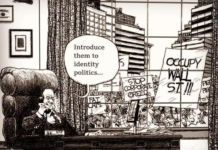
“WE’VE GOT IT!” Was the triumphant (if incautious) assertion of the supposedly neutral Professor Bob Chapman on the night of the 1969 “nearly-but-not-quite” general election. The worthy professor should perhaps be forgiven for his premature psephological ejaculation. He had marked down the electorate of Eden as the seat Labour was bound to take if it was on-course to becoming the government. On the night, Labour’s candidate, the distinguished New Zealand historian, Professor Keith Sinclair, had taken it. Chapman, whose Labour sympathies were well known to his colleagues (if not to the television audience) had waited nine long years to see the National Government of Keith Holyoake defeated. And, half-way through the election-night telecast, it seemed as though his political patience was being rewarded. That Keith Sinclair was also Chapman’s good friend and colleague merely slapped a good-sized dollop of icing on the cake.
By the end of the telecast, however, the story had changed. Sinclair’s narrow election-night majority notwithstanding, Labour had fallen four seats short of the 43 needed to win. An industrial dispute involving a ship called the Wainui – culminating in a march up Queen Street by the communist-dominated Seafarers’ Union – had cost the Labour leader, Norman Kirk, the Auckland seats he’d needed (and confidently expected) to secure the prime-minister’s job. Even Eden, after the counting of Special Votes, reverted to National’s John Rae by the wafer-thin margin of 67 votes.
It didn’t really seem possible that Labour could have lost. Its campaign had broken new ground in terms of media sophistication. Labour’s theme-song “Make Things Happen” had topped the local charts, and its television commercial, put together by a hungry young ad-man called Bob Harvey, was slicker than anything New Zealand voters had hitherto encountered. What’s more, between the 1966 and 1969 elections, New Zealand had passed through its sharpest economic downturn since the Second World War. Export prices had collapsed and unemployment had risen to a post-Depression peak. It seemed inconceivable that a nine-year-old government, offering such a lacklustre record, could possibly be re-elected. How was it that Holyoake won?
First-off, there was the rapidity of the country’s economic recovery. Export prices recovered and unemployment fell sharply in the months leading up to the 1969 election. National’s new finance minister, Rob Muldoon, was thus able to project competence and control in equal measure. To many voters, the 1967-68 recession seemed nothing more than a glitch, an aberrant departure from the steady upward trajectory of New Zealand’s post-war economic performance. Certainly, Muldoon’s message to the electorate was unequivocal: “I’ve got this!” His reputation as National’s “economic wizard” dates from this period.
But an improving economy wasn’t the only reason for National’s surprise win in 1969. There may have been growing ferment on the nation’s campuses, and increasing union militancy in the nation’s factories and freezing-works but, at heart, New Zealand remained a deeply conservative society. The events of the previous year: the annus horribilis of 1968; with its tragic list of assassinations (Martin Luther King, Bobby Kennedy) and its frightening clashes between young protesters and out-of-control police personnel (Paris, Chicago, Mexico City) had culminated not in revolution, but in the election of Richard Nixon as President of the United States. There was “something in the air”, alright – conservative paranoia!
And so, late in the evening of Saturday, 29 November 1969, it was a visibly relieved Keith Holyoake who gently chastised Professor Chapman for his earlier – premature – celebration of a Labour victory. Against all the odds, National’s three-term government had been returned for a fourth. Only the first Labour Government of Mickey Savage and Peter Fraser could boast an equal number of consecutive election victories (1935, 1938, 1943, 1946).
But, Holyoake was no fool. He knew that only “events, dear boy, events” had rescued his party from the jaws of certain defeat on 29 November 1969. Twenty-six months later, on 7 February 1972, just nine months out from the next scheduled general election, Holyoake would step away from the prime-ministership – passing-on a poison-smeared baton to his loyal deputy, Jack Marshall. Similarly, on the night of that agonisingly close contest (National’s 1969 vote, at 605,960, was just 13,905 votes ahead of Labour’s tally of 592,055) “Big Norm” Kirk was quietly confident that, in spite of losing the “nearly-but-not-quite” election of 1969, nothing short of divine intervention was going to prevent him from leading Labour to victory in 1972.





Rather depressing really.
Shit Chris I was a young 24yr old kiwi tradesman settling in Canada for the first year when this happend in 1969.
So I have to back out there, as I wasn’t around as I had left home (Napier) but when I came home Dad said that overseas funds were not needed any more for purchasing a new car by then.
I know that Keith Holyoake was a ‘softer National Government’ then than this modern version of National with their rough talking, rugged, adhession to savage austerity, penny pinching, that is crushing us all now.
I remember this because i was a new tradesman in 1966 when I was signed onto the Ministry of Works at Turangi in December 1966, then when Keith holyoake came to vist the damsite with his photo ops I remember how soft spoken he was then.
Keith Holyoake was a wide mile apart from the average rough speaking National Party member is today.
Sad to have to say this, it was another softer era that I often yern for again now.
But I haven’t a clue about who the top players in Government were then in 1969 though i do recall another National Minster – Brian Talboys who was also another demure character like Keith Holyoake was.
I bow to your vast knowledge of this part of our history.
Very informative the article is thanks very much.
Hmmmm,…. so what message do we take from this , Chris ,…’ don’t count yer chickens before they hatch ‘ ?… or is there something else you’ve seen taking place recently ?…
Well do see that John Key handed on the poisoned baton to Bill English,…
Like Holyoake did to Marshall,… however ,… has this election got its ‘ Eden “nearly-but-not-quite”’ scenario ? ‘…
I’m not so sure,… and I believe the Greens are going to shock National this time round despite their media plants best attempts.
This is the second less than positive article on here that wants to see Labour lose the election or implies that it will.
And you assertion contributes to the debate how exactly?
by making an observation.
I’m taking it as an interesting conversation, about the twists and turns and last minute stumbles of an election campaign.
If i were a supporter of the current Labour Party I wouldn’t take it personally. Equally, if all I wanted was eternally optimistic pro Labour stories I’d just stick to press releases and certain author on the Standard
Is there a point to this?
trotter trotting out more bull we live in different times for starters. Maori are much more politically active and politics is more inclusive. We also have a different mixture of ethnicities. And our Pakeha whanau back then in the 1960s had a very antiquated way of thinking.
Fast forward to 2017. No one in Labour is saying “WE’VE GOT IT!” though.
I am always so so so deeply woried at Nationa’s proven dark ways to overturn our democracy and still believe they may have planned to rig the eection already despite my efforts to request offical information from the electoral Comission for evidence last year that the election cannot be ‘riged’ the reply from the Electoral Commissionsaid qoute; “we cannot confirm whether the paper balot made by the voter can be verified as correct or not afterwards’.
So as you see I am very worried that forward voted forms may now be being altered because we cannot ever confirm this as the Electoral Comission confirms.
That was why last year we asked the comission to begin using the new overseas VVPAT (verified voting paper audit trail) voting system but the Electoral Commissin refussed tochange to VVPAT then in June last year.
We based everytthing ontrust so if national can’t be trusted you may have answered the question that you may have,
Anyway look up the VVPAT voting system as canada and USA use it as many others do including phillipines also.
https://www.verifiedvoting.org/resources/vvpr-legislation/
more subliminal messages courtesy of trotter
Hmmmm….. a swamp Kauri log poacher in Northland,… knocking out Aucklands fuel supply…
OK Chris. I’ll bite. What IS the 2017 equivalent of a communist-based union march in Auckland?
Where will it come from? Who needs to be bribed, soothed, promised to stop them ‘pissing in the soup’ for spite?
And while we’re watching the ‘obvious candidates’ – who might it be screaming ‘If I can’t have you no one will!’ before they hurl the petrol and chuck the match? Hell hath no fury like a polly scorned, slighted, or passed over, even in private.
Dramatic? Perhaps not. How many good blokes, quiet and mild mannered, have killed their wives and kids – just this year alone? Are politicians immune from that level of unreasonableness? Hell no!
I hope the minders are alert and the grape vine is in good order to quickly stifle any tendency toward ‘Made it, ma! Top of the world!’ https://www.youtube.com/watch?v=bytoID_SNnE
Comments are closed.